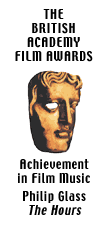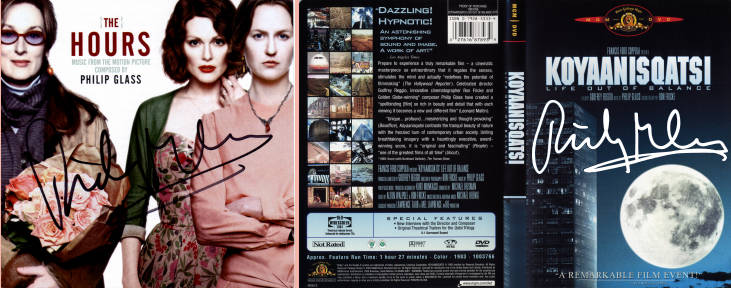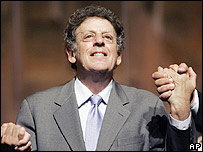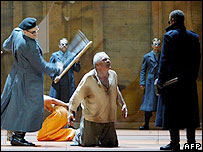Philip Glass got a 15-minute standing ovation at the world premiere of his new opera Waiting for the Barbarians, in Germany in September 2005.
The opera is based on the novel Waiting for the Barbarians by South African writer JM Coetzee, with a libretto by Christopher Hampton. This is Glass's 21st work for the stage.
The opera deals with state-sponsored torture and repression, and explores the way in which modern-day white society is coming to terms with its legacy of centuries of repression of indigenous black cultures.
The "barbarians" of the title are a people who live a traditional way of life and are therefore deemed by the "civilised" whites to be socially and racially inferior.
Although Glass has said he sees the opera as a critique of President Bush's administration and its war in Iraq, its sets and costumes are timeless, in keeping with the universality of Glass' themes. The music is in the "minimalist" style that characterizes Glass's music, and for which he won the BAFTA for The Hours.
Waiting for the Barbarians was performed six times at the Erfurt Theatre in Germany. It will move to Amsterdam in the spring of 2006, and then to Austin, Texas, in January 2007.
A PERSONAL REFLECTION ON PHILIP GLASS by D’Lynn Waldron,PhD.
Philip Glass is a composer who goes his own way and lets the world catch up. He was studying Indian music before the Beetles, and pioneered the use of repetitive rhythms in movie scoring.
Philip Glass's distinctive style makes an essential contribution to The Hours by uniting its three separate, but interwoven stories and, most important, sustaining the tension between them. The stories depict the effect the book 'Mrs. Dalloway' has on the lives of three women; the author Virgina Woolf (Nicole Kidman), and two fictional American woman, one in the 1950's (Julianne Moore), and another in 2000 (Meryl Streep).
I saw the film at an early private screening with Philip Glass and told him I thought his score was going to win awards because of all the scores in 2002, his made a uniquely essential contribution to a film. He won the prestigious British Academy Award on February 24, 2003. I was at the Los Angeles British Academy Awards luncheon that is held in conjunction with the ceremony in London, and I must say Maestro Glass seemed very happy indeed that his often controversial music got this mainstream tribute.
Philip Glass is a scholar and a pioneer of musical forms, who is always striving to do something beyond what he has already done. Towards this end, he feels that the more successful a project was the more important it is, for the next project, to change at least one of the people who worked on it (and he likes working with young people) so they will not just repeat their success, which he sees as the greatest trap for anyone in the creative arts.
Philip Glass is a personable, very intelligent man who values friendships and enjoys working relationships that are based on mutual trust.
Philip Glass was born in Baltimore, Maryland on 31 January 1937 and classically trained at the University of Chicago, the Juillard School, and in Paris where he developed his 'minimalist' musical style.
It was through his teacher in Paris that Philip Glass learned that after a composer has mastered technique, he develops his own style, and what makes his own style is his personal and customary way of solving the problems of musical composition. It is this customary way of solving musical problems that makes a composer’s work recognizable.
After his classical training in Western music, Philip Glass met Ravi Shankar who would be his lifelong friend and guru in Eastern music.
Eastern music takes its structure from rhythm rather than harmonics, and Glass was able use this to enrich his compositions in ways that had not been done before in Western music.
Philip Glass, like all composers, has faced the choice between ‘pure music’ and music composed to be a part of a movie or theatrical production. Glass particularly likes writing operas, of which he has done many, because that is the one theatrical form in which the composer is in charge, whereas in movies it is the filmmaker, and in dance the choreographer. His operas include the revolutionary Einstein on the Beach. He has also written many concert pieces and dances. His songs include the one for the 1996 Atlanta Olympics.
After seeing a screening of Gantz’ silent classic Napoleon with music by a live symphony orchestra, Glass composed a symphonic piece to be played along with projected images. Thus he created a form in which the composer decides what the audience will see with his music.
Philip Glass' film career began in 1983 with Koyaanisqatsi, the first of Godfrey Reggio's trilogy of visually stunning, thought-provoking documentaries, that includes Powaqqatsi in 1988 and Naqoyqatsi in 2002.
Philip Glass does commercially oriented films, but he is particularly favored for films with a strong intellectual content. He was Oscar nominated for Martin Scorsese's Kundun. His interest in film as an art medium led him to do a new score for James Whale's 1931 horror classic Dracula, starring Bela Lugosi.. Look for Philip Glass on-screen as a pianist in The Truman Show.
Philip Glass’s most recent film score, for the critically acclaimed The Hours was one that other composers had failed at before it was brought to him.
The Hours is based on a Pulitzer Prize winning novel. It juxtaposes a day in the life of three different women. The film briefly begins and ends in 1941 with the novelist Virginia Woolf committing suicide by walking into a river with rocks in her coat pockets. It then centers on the day in 1923 when Virginia Woolf, who struggled all her life against mental illness, begins writing her great novel Mrs. Dalloway. The film interweaves Virginia Woolf’s day with a day in the life of two women in America- one in 1951 and one in 2001. The three women’s stories are linked by influence of the novel Mrs. Dalloway and by parallels to it in their own lives.
For The Hours, Philip Glass had to decide whether he would use his music to keep the audience oriented to the rapidly shifting time and place, or to use his music to tie the stories together. He decided he should tie the stories together and did it brilliantly with rhythmic themes that carried the tension through the interwoven stories. His predominant use of piano avoided the problem of orchestration that would be related to any one of the time periods in the film. His use of his own unique musical style also reinforced the outside of time and space essence of the story. For this score he won the British Academy BAFTA, and mine as one of the votes he got.
Philip Glass likes to begin with a script which for him is like having the libretto of an opera. He watches the assembled movie several times, takes inspiration from it, then lets the sharp edges go from his memory of it, which frees him from being a slave to the movie and allows a spaciousness in his scores.
Like most composers, he hates temp tracks especially when done with his own music because he does not like the expectations that creates; “They want me to repeat 30 years’ of my greatest hits!”
The temp track for The Hours included two pieces of Glass's music that he told them he could not improve on or even replicate because they were done with inspiration that cannot be called up at will. These pieces were then used in the score as originally written.
Philip Glass like most movie composers was glad for the chance to include in his CD of the score for The Hours some favorite cues that were not in the final version of the movie, and he was able to rearrange the cues into a suite that stands on its own, while at the same time evoking the movie for the listener.
There is much for young composers to learn from how Philip Glass has approached his life and music, and his 1987 book MUSIC BY PHILIP GLASS by Philip Glass is well worth reading. (He was surprised and happy that I had found a copy in my local library, but he asks that anyone checks his book out, please return it for others to read. If you want to own a copy, they can be purchased from rare book dealers on the Internet.)
Philip Glass's own amazing web site: http://www.philipglass.com/
 PHILIP GLASS FILMOGRAPHY
PHILIP GLASS FILMOGRAPHY
The Hours (2002)
Condo Painting (2000)
The Eden Myth (1999)
The Source (1999),
The Truman Show (1998)
Kundun (1997)
Bent (1997)
Absence Stronger Than Presence (1996)
Ballad of the Skeletons (1996)
Joseph Conrad's The Secret Agent (1996),
Candyman: Farewell to the Flesh (1995)
The Interview (1995)
A Brief History of Time (1992)
Candyman (1992)
Anima Mundi (1991)
Closet Land (1991)
Mindwalk (1990),
La Chiesa (1988)
Powaqqatsi (1988)
The Thin Blue Line (1988),
Einstein on the Beach - The Changing Image of Opera (1987) Hamburger Hill (1987)
Dead End Kids (1986)
Mishima (1985),
High Wire (1984),
Four American Composers (1983)
Koyaanisqatsi (1983)
Dracula- rescoring the 1931 original.
PHILIP GLASS AWARDS
2003 The British Academy (BAFTA) Film Award for Achievement in Film Music
1997 Academy Awards - Nominee, Best Original Dramatic Score - Kundun
1998 Golden Globes - Winner, Best Original Score - The Truman Show
1997 Golden Globes - Nominee, Best Original Score - Kundun
Philip Glass's own amazing web site: http://www.philipglass.com/
copyright 2006 by D'Lynn Waldron

![]()
![]()



 PHILIP GLASS FILMOGRAPHY
PHILIP GLASS FILMOGRAPHY